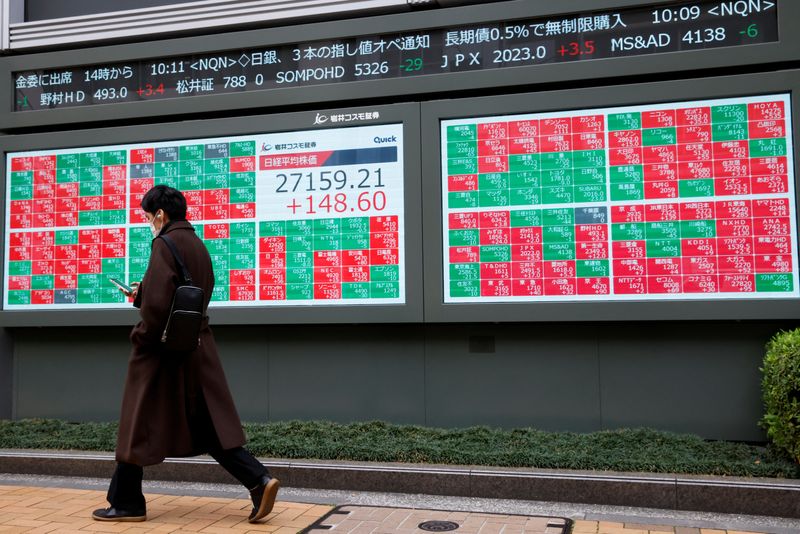By Caroline Valetkevitch
NEW YORK (Reuters) -World stock indexes dropped on Thursday, with the Nasdaq ending more than 2% lower after Meta Platforms and Microsoft (NASDAQ:MSFT) warned of rising costs for artificial intelligence, while the dollar weakened slightly after U.S. data did little to suggest a change to Federal Reserve policy.
The earnings reports added to concerns among investors that the pay-off for heavy spending on AI may take longer than many had hoped.
Shares of Facebook (NASDAQ:META) owner Meta were down 4.1% while Microsoft was 6% lower, with both weighing on the Nasdaq and S&P 500.
"Much of the adjustment in the market is the forward expectations," said Howard Chan, chief executive officer of Kurv Investment Management in San Francisco.
But "there are a lot of reasons to think that good earnings will continue," he said. "We still hold the thesis that infrastructure around AI will still do well."
After the closing bell, shares of Amazon.com (NASDAQ:AMZN) were up 4.5% after it posted third-quarter profit and sales that beat Wall Street estimates, while Apple shares (NASDAQ:AAPL) eased 2% following its outlook.
Amazon ended the regular session down 3.3% while Apple ended down 1.8%.
Early on Thursday, data showed U.S. consumer spending increased slightly more than expected in September, putting the economy on a higher growth trajectory heading into the final three months of the year.
Another U.S. report showed the employment cost index (ECI), the broadest measure of labor costs, rose 0.8% in the third quarter. That was the smallest gain since the second quarter of 2021 and followed an unrevised 0.9% increase in the second quarter.
The dollar also came under pressure against the yen after the Bank of Japan took a less dovish tone than expected, while the euro was stronger after data showed the bloc's inflation accelerated more than expected in October, bolstering the case for caution in European Central Bank interest rate cuts.
The dollar index, which measures the greenback against a basket of currencies, fell 0.2% to 103.88, with the euro last 0.04% higher against the dollar at $1.0859. Against the Japanese yen, the dollar was down 0.8% at 152.18 yen.
Traders see a 25 basis point cut at the Fed's Nov. 6-7 meeting as near certain, but only a 70% chance of a 25 basis point reduction at both its November and December meetings, according to the CME Group's (NASDAQ:CME) FedWatch Tool.
Friday's U.S. jobs report for October will be closely watched, as well as the U.S. presidential election on Tuesday.
Opinion polls still are putting Republican Donald Trump and Democratic Vice President Kamala Harris neck and neck.
The Dow Jones Industrial Average fell 378.08 points, or 0.90%, to 41,763.46, the S&P 500 fell 108.22 points, or 1.86%, to 5,705.45 and the Nasdaq Composite fell 512.78 points, or 2.76%, to 18,095.15.
For the month, the S&P 500 fell 0.99%, the Nasdaq declined 0.52%, and the Dow fell 1.34%. Both the Dow and S&P snapped a five-month streak of gains.
MSCI's gauge of stocks across the globe fell 12.64 points, or 1.50%, to 832.30. The index was down 2.3% for the month of October, also breaking a five-month streak of increases.
The STOXX 600 index ended 1.2% lower.
U.S. Treasury yields rose after the U.S. economic data.
Benchmark 10-year yields were last up 1.8 basis points at 4.282%. They reached a nearly four-month high of 4.339% on Tuesday.
In cryptocurrencies, bitcoin, the world's largest cryptocurrency by market cap, was 3.2% lower at $70,458, about 4% shy of its record high from March.
Gold retreated after hitting a record high, while safe-haven demand helped the precious metal log its fourth straight monthly gain.
Spot gold was down 1.6% at $2,740.45 per ounce, after hitting a record high of $2,790.15 earlier in the session. Prices have firmed around 4% for the month.

Oil prices extended gains after settlement, rising on a report that Iran is preparing to attack Israel from Iraqi territory in the coming days.
WTI crude oil futures jumped $1.81 to $70.42 at 3:00 p.m. EDT, after settlement and Brent futures for January delivery jumped by $1.82 to $73.98. U.S. crude rose 1.33% to $69.52 a barrel and Brent rose to $73.23 per barrel, up 0.94% on the day.
